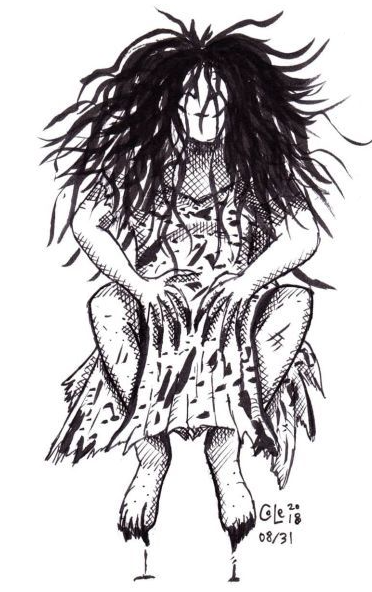
フピア(死者霊)
hupia,
the spirit of a person who has died in the Taíno

Felicia
Felix-Mentor as a Haitian Zombie from Zora Neale Hurston's "Tell My
Horse: Voodoo and Life in Haiti and Jamaica," 1938
★ タイノ族の精神信仰において、フピア(死者の幽霊の魂)はゴーイア(生者の魂)と対比される。生きているゴーエイザには明確な形があるが、死後、その魂は フピアとなって解き放たれ、コアイベイと呼ばれる地球上の遠く離れた楽園に住むことになる。[1][2] フピアは多くの姿に変身できると信じられており、時には顔のない人として現れたり、亡くなった愛する人の姿を取ったりする。人間の姿をしたフピアは、へそ がないことで常に区別できる。また、フーピアはコウモリとも関連付けられており、昼間は隠れたり眠ったりし、夜になると出てきてグアバの実を食べると言わ れていた。
| In Taíno culture,
the hupia (also opia, opi'a, op'a, operi'to) is the spirit of a person
who has died. In Taíno spiritual beliefs, hupias (ghost spirits of those who had died) were contrasted with goeiza, spirits of the living. While a living goieza had definite form, after passing away the spirit was released as a hupia and went to live in a remote earthly paradise called Coaybay.[1][2] Hupias were believed to be able to assume many forms, sometimes appearing as faceless people or taking the form of a deceased loved one. Hupias in human form could always be distinguished by their lack of a navel. Hupias were also associated with bats and said to hide or sleep during the day and come out at night to eat guava fruit. |
タイノ族の文化に
おいて、フピア[ウピア](別名:オピア、オピア、オピア、オペリート)とは死者の魂を意味する。 タイノ族の精神信仰において、フピア(死者の幽霊の魂)はゴーイア(生者の魂)と対比される。生きているゴーエイザには明確な形があるが、死後、その魂は フピアとなって解き放たれ、コアイベイと呼ばれる地球上の遠く離れた楽園に住むことになる。[1][2] フピアは多くの姿に変身できると信じられており、時には顔のない人として現れたり、亡くなった愛する人の姿を取ったりする。人間の姿をしたフピアは、へそ がないことで常に区別できる。また、フーピアはコウモリとも関連付けられており、昼間は隠れたり眠ったりし、夜になると出てきてグアバの実を食べると言わ れていた。 |
| Concept of the Hupias or Ghost
Spirits On the matter of what the Tainos believed as to the Hupia (Ghost Spirit). The Taino people never believed in the concept and or idea of Death, as they believed in passing on of the human spirit and an Hereafter life. The Spanish historians and writers of the time however gave their own bias religious interpretation based upon their own Catholic and Christian ideas and or concepts of Death and as to the soul of the humans going to some place they call Heaven and the soul awaiting a day of judgement by their God.[citation needed] |
フピアまたは幽霊の概念 タイノ族がフピア(幽霊)をどう信じていたかということについて。タイノ族は死という概念や考えを信じていなかった。彼らは人間の魂が転生し、来世がある ことを信じていたからだ。しかし、当時のスペインの歴史家や作家たちは、カトリックやキリスト教の死や魂に関する考えに基づいて、自分たちの偏った宗教的 解釈を提示した。彼らは、人間の魂は天国と呼ばれる場所に行き、神による審判の日を待っていると主張した。[要出典] |
| In popular culture In the novel Jurassic Park by Michael Crichton, hupia are suspected of an attack on an 18-year-old boy working on construction for Jurassic Park on the fictional island of Isla Nublar. The culprit is later described as a Velociraptor. Hupia are also accused of a rash of attacks on infants and other people in rural Costa Rica. They are described as "faceless night ghosts who kidnapped small children". Later events show that the real culprits were Procompsognathus that had escaped from Isla Nublar.[3] |
大衆文化において マイクル・クライトンの小説『ジュラシック・パーク』では、架空のヌブラ島でジュラシック・パーク建設に従事していた18歳の少年がフーピアによる攻撃を 受けたと疑われている。 後に犯人はヴェロキラプトルと説明されている。 フーピアはまた、コスタリカの田舎で乳児や他の人々を襲ったとして非難されている。彼らは「小さな子供をさらう顔のない夜の亡霊」と描写されている。 その後の出来事から、真犯人はヌブラ島から逃げ出したプロコンプソグナトゥスであることが判明した。[3] |
| Mask Master: Taino Dictionary
(Link no longer working as of Oct. 25, 2024. No record in Internet
Archive.) Dasrath, Sparky. The Arawaks Deiros, Pablo. Fundación Kairós. Religiones indígenas del área caribeña Guitar, Lynne. 2005. Taino Caves Poviones-Bishop, Maria. The Kislak Foundation. The Bat and the Guava: Life and Death in the Taino Worldview Archived 2008-07-24 at the Wayback Machine |
マスク・マスター:タイノ語辞典(2024年10月25日よりリンク切
れ。インターネットアーカイブに記録なし) Dasrath, Sparky. The Arawaks Deiros, Pablo. Fundación Kairós. Religiones indígenas del área caribeña Guitar, Lynne. 2005. Taino Caves Poviones-Bishop, Maria. The Kislak Foundation. The Bat and the Guava: Life and Death in the Taino Worldview Archived 2008-07-24 at the Wayback Machine |
| https://en.wikipedia.org/wiki/Hupia |
|
| A hupia is a type of ghost in
the folklore of the Taíno peoples of the Caribbean. They are said to
assume many forms, most often as a faceless person. In human form, they
are also said to lack a navel. They are sometimes said to appear in the
guise of a lost loved one. Hupias are nocturnal, appearing only at night. They are rumoured to seduce women and kidnap people who dare to venture outside after dark. Some say that, like bats, they enjoy eating guava. |
ウピア(フピア)とは、カリブ海のタイノ族の民話に登場する幽霊の一種
である。様々な姿を取るとされるが、最も多いのは顔のない人格である。人間の姿をしている場合は、へそがないとも言われている。時には、失った愛する人の
姿をして現れるとも言われている。 ウピアたちは夜行性で、夜にだけ現れる。彼らは女性を誘惑し、日没後に外に出る勇気のある人民を誘拐すると噂されている。コウモリのようにグアバを好んで 食べるという話もある。 |
| https://x.gd/CLNLt |
☆
リ ンク
リ ンク(文化人類学と複数性の概念)
ゾ ンビリンク
文 献(pdf)
文 献
そ の他の情報
Copyleft, CC, Mitzub'ixi Quq Chi'j, 1996-2099
☆
 ☆
☆